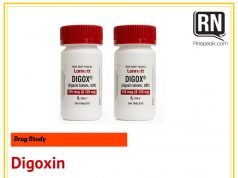Generice Name: Mefenamic Acid
Brand Name:Ponstan, Ponstel
Classifications:central nervous system agent; analgesic; nsaid; antipyretic
Pregnancy Category:C
Availability
250 mg tablets
Actions
Anthranilic acid derivative. Like ibuprofen inhibits prostaglandin synthesis and affects platelet function. No evidence that it is superior to aspirin.
Therapeutic effects
Analgesic, antiinflammatory, and antipyretic actions similar to those of ibuprofen.
Uses
Short-term relief of mild to moderate pain including primary dysmenorrhea.
Contraindications
Hypersensitivity to drug;GI inflammation,or ulceration.Safety in children <14 y, during pregnancy (category C), or lactation is not established.
Cautious use
History of kidney or liver disease;blood dyscrasias;asthma;diabetes mellitus;hypersensitivity to aspirin. Long term use increases risk of serious adverse events.
Route & Dosage
Mild to Moderate Pain
adult: PO Loading Dose 500 mg
PO Maintenance Dose 250 mg q6h prn
Administration
Oral
- Give with meals, food, or milk to minimize GI adverse effects.
- Do not use drug for a period exceeding 1 wk (manufacturer’s warning).
Adverse effects
CNS:Drowsiness, insomnia, dizziness, nervousness, confusion, headache.
GI:Severe diarrhea, ulceration, and bleeding; nausea, vomiting, abdominal cramps, flatus, constipation, hepatic toxicity.
Hematologic:Prolonged prothrombin time, severe autoimmune hemolytic anemia (long-term use), leukopenia, eosinophilia, agranulocytosis, thrombocytopenic purpura, megaloblastic anemia, pancytopenia, bone marrow hypoplasia.
Urogenital:Nephrotoxicity, dysuria, albuminuria, hematuria, elevation of BUN.
Skin:Urticaria, rash, facial edema.
SpecSenses:Eye irritation, loss of color vision (reversible), blurred vision, ear pain.
BodyWhole:Perspiration.
CV:Palpitation.
Respiratory:Dyspnea; acute exacerbation of asthma; bronchoconstriction (in patients sensitive to aspirin).
Nursing implications
Assessment & Drug Effects
- Assess patients who develop severe diarrhea and vomiting for dehydration and electrolyte imbalance.
- Lab tests: With long-term therapy (not recommended) obtain periodic complete blood counts, Hct and Hgb, and kidney function tests.
Patient & Family Education
- Discontinue drug promptly if diarrhea, dark stools, hematemesis, ecchymoses, epistaxis, or rash occur and do not use again. Contact physician.
- Notify physician if persistent GI discomfort, sore throat, fever, or malaise occur.
- Do not drive or engage in potentially hazardous activities until response to drug is known. It may cause dizziness and drowsiness.
- Monitor blood glucose for loss of glycemic control if diabetic.
- Do not breast feed while taking this drug without consulting physician.








